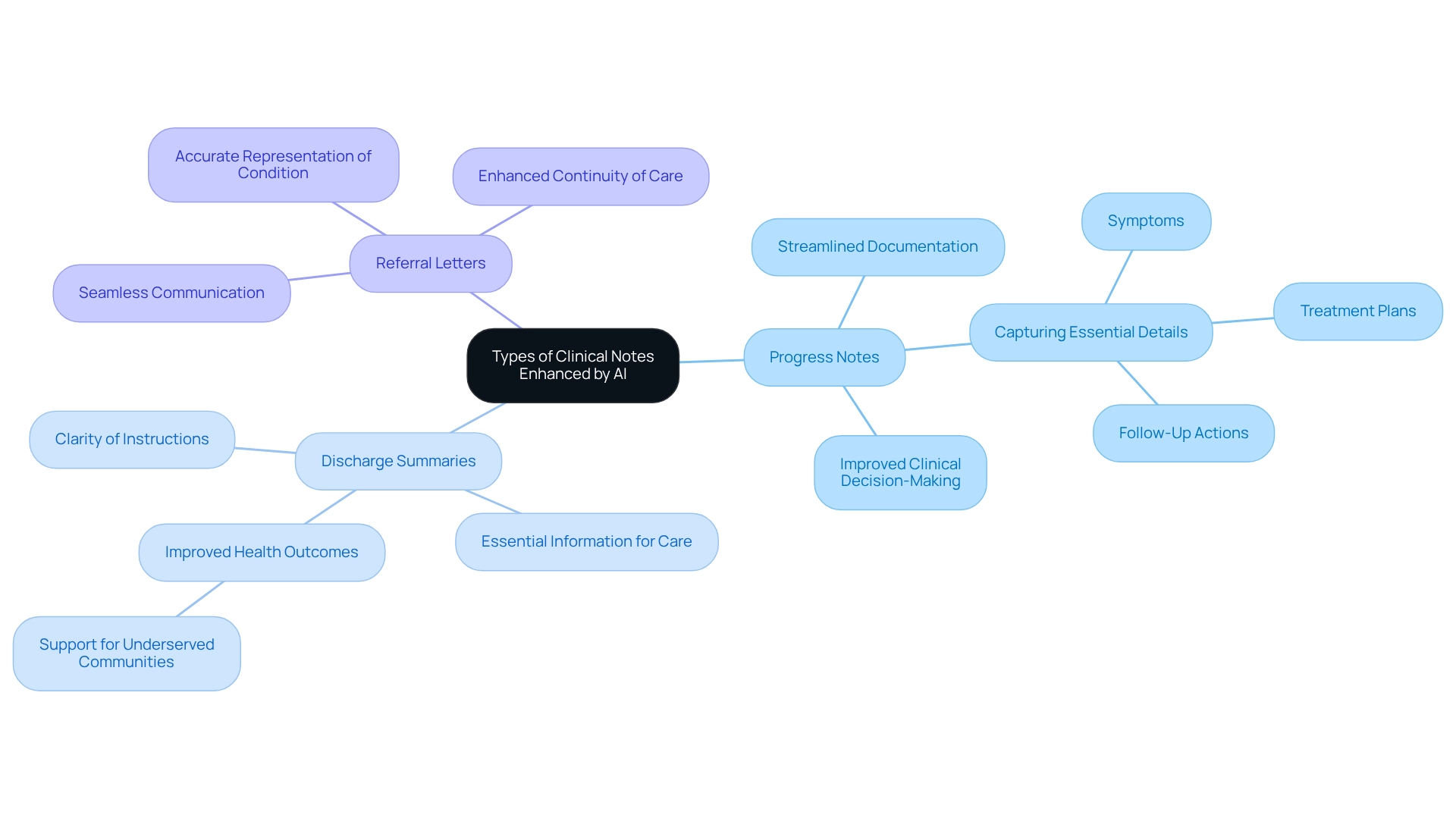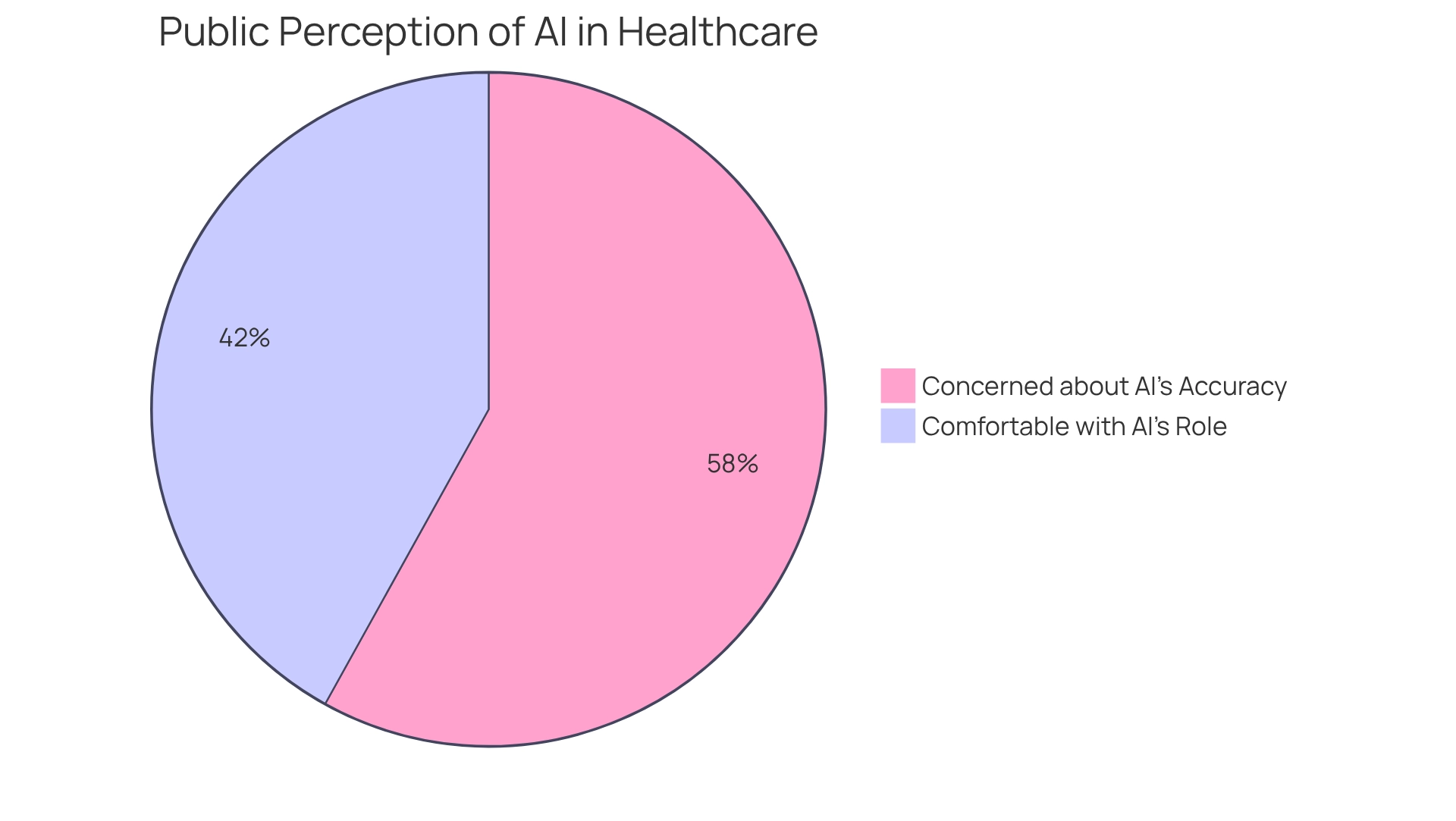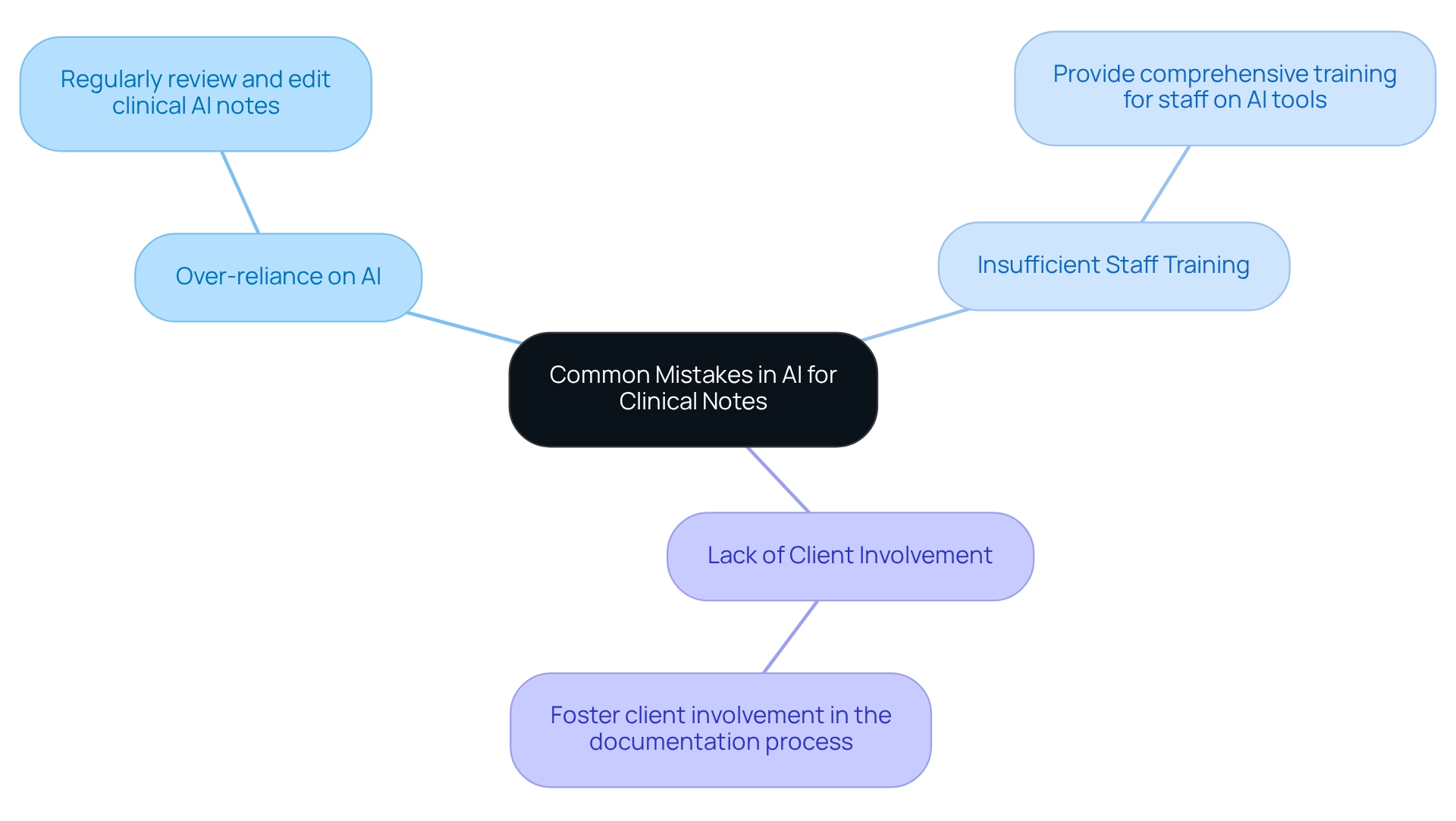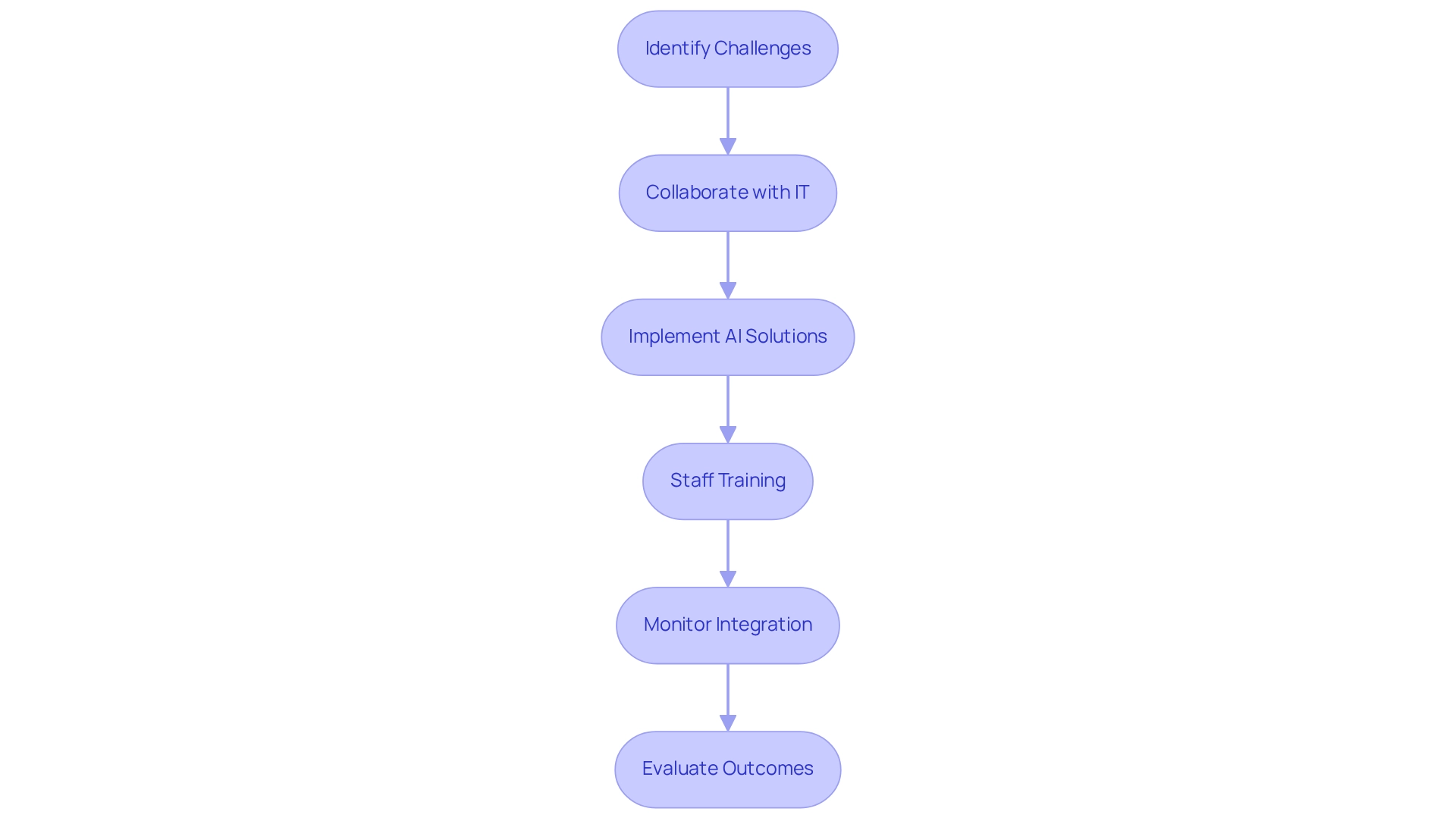Overview
In the demanding world of healthcare, providers often face significant emotional challenges, particularly when it comes to documentation. The integration of clinical AI notes offers a compassionate solution to these burdens, aiming to enhance both efficiency and patient care. By streamlining note-taking processes, AI not only improves record accuracy but also alleviates the administrative pressures that can detract from the quality of care.
Imagine a workflow where documentation no longer feels like an overwhelming task but a seamless part of patient interaction. The benefits of incorporating AI tools into existing workflows are profound: they reduce the time spent on paperwork, allowing healthcare providers to focus more on what truly matters—caring for their patients. However, it’s essential to acknowledge the challenges that come with this transition, such as data governance and the necessity for comprehensive training.
As we move forward, it’s crucial to foster an environment that supports healthcare providers in embracing these innovative tools. By prioritizing effective implementation and ongoing training, we can ensure that AI serves as a partner in enhancing patient care. Let’s take this step together, recognizing that by addressing these challenges, we can create a brighter future for both healthcare providers and the patients they serve.
Introduction
As artificial intelligence continues to reshape industries, its impact on healthcare is particularly profound, especially in the realm of clinical documentation. Have you ever felt overwhelmed by the administrative burdens of clinical notes? The integration of AI tools has the potential to revolutionize how healthcare providers manage these notes, enhancing both efficiency and accuracy. By automating the documentation process, AI alleviates the administrative pressures that often contribute to physician burnout, ensuring that critical patient information is captured and organized in real-time.
As the healthcare landscape evolves, understanding the nuances of AI's role in documentation becomes essential for providers aiming to improve patient outcomes and streamline their workflows. Imagine a future where clinical note-taking is significantly transformed, allowing you to focus more on patient care rather than paperwork. With a growing trend towards automation, this future promises to enhance the quality of care in ways we have yet to imagine. Let's explore how embracing these innovations can lead to a more fulfilling and impactful practice.
Understanding the Role of AI in Clinical Note-Taking
AI is transforming the creation of , easing the recording process that has traditionally consumed much of providers' valuable time. Imagine being able to create precise and thorough notes during or right after interactions with individuals. By utilizing CosmaNeura's AI tools, clinicians can achieve this, enhancing record-keeping efficiency and improving the quality of patient files. This ensures that essential information is captured swiftly and accurately, allowing for better patient care.
As we look ahead, recent statistics indicate that by 2025, around 60% of healthcare providers will be employing AI for record management. This reflects a growing trend toward automation in medical environments. CosmaNeura's AI systems can analyze conversations in real-time, generating notes that encapsulate the nuances of patient-provider interactions. This capability helps maintain vital context and details that are often overlooked in manual note-taking, thereby improving the overall quality of records.
However, it is important to acknowledge the challenges that come with this advancement. A scoping review following PRISMA guidelines has highlighted the need for further research to address issues related to AI in medical record-keeping. While AI tools can significantly enhance efficiency, moderately high error rates currently limit their extensive use as . As Anton Lukianchenko pointed out, data governance remains a key obstacle in achieving regulatory compliance for trial data, which can also impact the deployment of AI in medical settings.
Case studies focusing on identifying record trends using AI illustrate how these tools can monitor and evaluate medical record patterns. This analysis guides improvements in electronic health record (EHR) systems, leading to more standardized forms and increased efficiency in record-keeping practices. For instance, a recent case study revealed that medical providers utilizing CosmaNeura's AI solutions reduced their record-keeping time by 30%. This allows them to focus more on patient care, which is truly transformative.
As leaders in the medical field emphasize, incorporating CosmaNeura's AI into clinical AI notes not only simplifies administrative duties but also allows providers to devote more time to patient interaction. This ultimately promotes improved patient outcomes. The continuous progress in AI technology promises to enhance the documentation process, turning it into an essential resource in contemporary medical practice. For healthcare providers, these advancements can significantly alleviate administrative burdens, aligning with the mission of Cosmonauts to enhance the quality of care through innovative solutions while addressing the resistance to innovation that many healthcare professionals encounter.
Types of Clinical Notes Enhanced by AI
AI technology significantly enhances the quality of clinical AI notes, including progress notes, discharge summaries, and referral letters. Have you ever felt overwhelmed by the documentation process? AI excels in summarizing interactions for progress notes, effectively capturing essential details such as symptoms, treatment plans, and follow-up actions. This capability not only streamlines documentation but also ensures that critical information is readily available for clinical decision-making. It addresses the challenge of fragmented communication in healthcare delivery, a significant concern contributing to physician burnout, as reflected in clinical AI notes.
Discharge summaries also benefit from AI's efficiency, enabling swift creation that provides individuals with clear instructions and essential information about their care upon leaving the facility. This clarity is crucial for individual understanding and adherence to post-discharge plans, ultimately improving health outcomes, especially for those in underserved communities. Imagine the peace of mind that comes with clear guidance during a vulnerable time.
Furthermore, AI plays a vital role in creating referral letters, ensuring they accurately represent the individual's condition and the reasons for referral. This improvement fosters seamless communication among medical providers, enhancing continuity of care and addressing physicians' concerns regarding the quality of interactions with individuals.
The incorporation of clinical AI notes in clinical records not only enhances precision but also greatly reduces the administrative load on medical professionals. This shift allows them to devote more time to patient care, which is what truly matters. As highlighted in the systematic review titled ',' clinical AI notes significantly improve documentation efficiency, although the quality of these AI-generated notes can vary. Stakeholder opinions were largely favorable, emphasizing simplicity and decreased workload—crucial factors in overcoming resistance to innovation in the medical field.
As the only company creating AI solutions for the billion-dollar faith-focused healthcare market, Cosmonaut is uniquely positioned to leverage these advancements. Clinicians have reported that AI improves their workflow, enabling greater attention to client care. Embracing AI-driven solutions will be essential for optimizing clinical workflows and enhancing overall patient outcomes.
To improve the integration of clinical AI notes, consider enhancing data quality, fostering collaboration, and investing in education and training. These steps are essential for maximizing the advantages of AI in medical record-keeping. Wouldn't it be beneficial to see particular case studies showcasing the effectiveness of AI solutions in practical situations? Such examples could further illustrate these points and tackle the resistance to innovation encountered by medical providers.

Practical Tips for Implementing AI in Clinical Documentation
Incorporating AI into medical records can feel daunting for healthcare providers. It's essential to choose AI tools that seamlessly integrate into existing workflows, alleviating some of the administrative burdens that can detract from patient care. Comprehensive training for staff is not just beneficial; it's crucial. When all team members feel confident using these technologies, they unlock the full potential of AI to enhance patient outcomes.
A fundamental understanding of AI is vital for doctors, trainees, and medical students. This knowledge enables them to interact efficiently with AI tools, ensuring these technologies are used to improve patient care effectively. By creating clear guidelines for assessing and modifying clinical AI notes, providers can ensure precision and compliance with medical standards.
Regular feedback sessions offer a valuable opportunity for providers to share experiences, fostering a culture of continuous improvement in . As AI technology evolves, it's important for healthcare providers to remain flexible, ready to adapt their practices to maintain efficiency and effectiveness in clinical documentation.
Consider these statistics:
- 54% of adults in the U.S. express concerns about AI's accuracy in medical diagnoses.
- This highlights the importance of medical professionals being well-versed in AI applications.
- Additionally, a recent survey found that 39% of U.S. adults are comfortable with AI's role in their medical treatment.
- This split viewpoint underscores the urgent need for improved education and transparency regarding AI's function in healthcare.
- As indicated in an AMA survey, tracking the performance of clinical AI notes is essential to ensure the reliability of AI-generated records.
By implementing optimal strategies for training and documentation, medical providers can enhance operational efficiency while fostering trust in AI technologies. Ongoing studies, such as one examining medical professionals' attitudes towards AI adoption in Dhaka city, Bangladesh, highlight the importance of understanding and addressing providers' concerns as AI becomes increasingly integrated into medical practices.
In summary, embracing AI in healthcare is a journey that requires support, education, and a commitment to continuous improvement. Together, we can navigate these changes, ensuring that technology enhances, rather than hinders, our ability to provide compassionate care.

Ensuring Compliance and Privacy in AI-Generated Notes
In the incorporation of AI for clinical records, healthcare providers face the emotional challenge of ensuring compliance with regulations like HIPAA, which is crucial for protecting individual data and maintaining confidentiality. This responsibility necessitates a thorough evaluation of AI technologies to guarantee they meet security standards, including robust encryption protocols for data during both transmission and storage. Establishing clear policies regarding access to and sharing of AI-generated notes is essential, ensuring that only authorized personnel can access sensitive information.
Regular audits and ongoing training on compliance practices can significantly enhance the security of patient data, fostering trust between providers and patients. Have you considered how these practices can alleviate some of the stress associated with data management?
Research indicates that implementing specific strategies, such as utilizing AI tools that streamline documentation processes and enhance data accuracy, can effectively reduce documentation time while maintaining high-quality standards. For instance, the TheraPro Team states, "We've been developing medical technology for 25 years, and our aim with TheraPro is for you to say 'wow'"—a testament to the transformative potential of well-designed AI solutions.
As medical organizations increasingly adopt generative AI, they encounter challenges related to data security and the accuracy of AI-generated outputs. A human-in-the-loop approach is recommended to mitigate these risks, emphasizing the need for robust risk management frameworks that ensure patient privacy and compliance with regulations. Insights from the case study titled "Risk Management in AI Implementation" highlight the importance of establishing such frameworks to navigate the complexities of AI in healthcare effectively.
Legal experts stress the importance of ensuring HIPAA compliance in , underscoring that failure to do so can lead to significant legal repercussions. Current trends in user data security for AI tools reveal a growing emphasis on transparency and accountability, with many organizations adopting advanced technologies to enhance data protection. By utilizing AI tools that prioritize client data privacy, such as those provided by CosmaNeura, medical providers can not only enhance operational efficiency but also strengthen their commitment to ethical medical practices, particularly in the faith-focused medical market. How can you leverage these advancements to better serve your patients?
Personalizing AI Notes for Enhanced Clinical Relevance
To enhance the relevance of clinical AI notes, healthcare providers face the challenge of tailoring the AI's output to meet their specific practice requirements and the unique characteristics of their patient population. This customization can involve adjusting parameters within the AI tool to prioritize the types of information that matter most to their individuals. By incorporating their diagnostic reasoning into the AI's recommendations, providers can ensure that the notes accurately reflect their personalized approach to care.
Natural Language Processing (NLP) has the potential to categorize illnesses based on medical notes and standardized codes, demonstrating how personalization can significantly improve health data management. It is crucial to consistently assess and adjust the AI's configurations based on input from patient interactions. This ongoing process not only enhances the utility of clinical AI notes for continuous care management but also fosters a deeper connection between AI outputs and the realities of clinical practice.
Consider this: a study revealed that surgical trainees using a VR simulator showed remarkable improvement in surgical dissection compared to their peers on standard training paths. This underscores the effectiveness of tailored approaches in education and practice. Additionally, predictive analytics plays a vital role in this customization, helping to forecast disease progression and identify individuals at higher risk for certain conditions. By leveraging the AI's predictive capabilities, healthcare providers can make more informed decisions and implement preventive measures that lead to better outcomes for their patients.
Consequently, clinical AI notes that are thoughtfully tailored can profoundly impact the quality of care delivered to individuals, resulting in more informed decision-making and improved health outcomes. By embracing AI for personalized medicine, service providers have the opportunity to transform patient care through customized treatments and enhanced results. Furthermore, the successful implementation of AI-based solutions often relies on the support of organizational champions, highlighting the importance of fostering a conducive environment for tailoring AI outputs.
It is also essential to address the risks and biases associated with Gen-AI applications. Organizations must establish frameworks to govern the use of clinical AI notes, ensuring that ethical considerations are upheld while personalizing these notes. This comprehensive approach not only addresses the challenges in but also ensures that AI solutions are applied responsibly and effectively.
Common Mistakes to Avoid When Using AI for Clinical Notes
In the implementation of clinical AI notes for clinical records, medical providers face emotional challenges that can impact their effectiveness. It’s crucial to remain vigilant about common pitfalls that could compromise these advanced tools. One prevalent issue is the over-reliance on clinical AI notes without thorough review. This can lead to inaccuracies and critical omissions. Regularly reviewing and editing clinical AI notes is essential to uphold high documentation standards and ensure patient safety.
Significantly, 59% of industry leaders implementing generative AI are already collaborating with third-party vendors to create tailored solutions. This trend emphasizes the importance of cooperation in AI application, particularly regarding training and oversight.
Another significant mistake is the insufficient training of staff on the use of AI tools. This lack of training can lead to inconsistent application and missed opportunities for enhancing operational efficiency. As medical leaders emphasize, proper training is crucial for maximizing the benefits outlined in in clinical settings.
In December 2023, only 25% of the interviewed healthcare executives had implemented generative AI solutions. This underscores the need for vigilance in its application.
Moreover, recognizing the significance of client involvement in the documentation process is vital. While AI can significantly streamline administrative tasks, it should never replace the essential human interaction that is fundamental to quality patient care. How can we ensure that technology complements rather than replaces this interaction? This sentiment is reflected in the case study titled 'Doctors' Perspectives on AI in Medicine,' illustrating the varying viewpoints among medical professionals regarding AI's role. It reinforces the need for ongoing dialogue about its integration.
Furthermore, a recent survey showed that among Americans aware of mental health chatbots, 71% would prefer not to utilize one for their own assistance. This highlights the importance of preserving human interaction in medical support. Balancing the efficiency of AI with the compassionate touch of healthcare professionals is key to delivering optimal experiences for those receiving care.
Key Solutions:
- Regularly review and edit clinical AI notes.
- Provide comprehensive training for staff on AI tools.
- Foster client involvement in the documentation process.
By addressing these challenges together, we can create a healthcare environment that values both technological advancements and the irreplaceable human connection.

Integrating AI Tools with EHR Systems for Streamlined Workflows
Incorporating AI instruments with Electronic Health Record (EHR) systems is crucial for enhancing workflows in medical documentation. Healthcare providers face significant challenges, and prioritizing AI solutions that align with their existing EHR platforms can alleviate some of these burdens. This integration not only facilitates seamless data transfer but also minimizes workflow disruptions, allowing clinical AI notes to be automatically added into medical records. As a result, the need for duplicate data entry is significantly decreased, improving overall operational efficiency.
Collaboration with IT teams is equally important to ensure a smooth integration process. Addressing any technical challenges promptly can prevent workflow interruptions and maintain productivity. Regular training sessions for staff are vital, as they empower users to adapt to the integrated system and fully utilize the capabilities of both AI and EHR technologies.
Statistics indicate that the integration of AI with EHR systems can lead to substantial improvements in . For instance, optimized workflows through AI and EHR integration have been shown to lessen administrative loads, enabling providers to concentrate more on patient care. However, it’s important to acknowledge that in the United Kingdom, 63 percent of the adult population is not comfortable with providing personal data to improve healthcare through AI. This highlights public concerns that may hinder AI adoption.
Expert opinions emphasize that successful AI implementation in healthcare environments is influenced by local conditions and individual work processes. As Professor Nick Guldemond states, "the use of AI in everyday clinical practice that local conditions and individual work processes have a major influence on the success of AI implementation." This underscores the need for customized solutions that fit specific medical environments, ensuring that providers feel supported.
Case studies have shown the positive effect of regulatory oversight in the incorporation of AI in medical services, ensuring ethical practices and effective data management. For example, establishing regulatory oversight can help address challenges related to data privacy and security, further enhancing the trustworthiness of AI applications in clinical settings. The absence of AI adoption may obstruct progress in medical efficiency and innovation, making it essential for providers in this field to embrace these technologies.
As we progress into 2025, the focus on integrating clinical AI notes with EHR systems will continue to grow, paving the way for more efficient and effective medical service delivery.
To tackle the challenges encountered by medical providers, such as physician burnout and administrative burdens, it is essential to implement AI solutions that not only streamline workflows but also assist professionals in their daily tasks. By integrating user-friendly AI tools and offering comprehensive training, healthcare organizations can boost provider efficiency and enhance care outcomes. Together, we can create a more supportive environment for healthcare professionals, ensuring they can focus on what truly matters—their patients.

The Future of AI in Clinical Documentation: Trends and Innovations
The future of AI in clinical records presents an opportunity for transformative advancements, especially with the integration of clinical AI notes. This progress is largely driven by ongoing innovations in machine learning and natural language processing. As we look ahead, emerging trends suggest the development of that can grasp context and nuance in interactions, leading to more accurate and relevant records. For instance, the anticipated growth of AI combined with telehealth platforms will enable real-time record-keeping during virtual appointments, ultimately enhancing the patient experience.
Yet, as medical providers embrace these promising technologies, they face emotional challenges. Many physicians remain hesitant about innovation, concerned about maintaining the quality of care and the integrity of patient interactions. This risk aversion can hinder the adoption of AI solutions, making it crucial for startups to directly address these concerns. By 2030, a significant portion of clinical documentation is expected to be influenced by clinical AI notes, with 64% of clinicians in regions like South America and Asia Pacific believing these notes will play a pivotal role in their decision-making processes.
However, scaling these AI systems requires careful consideration. Attention to deployment modalities, regulatory frameworks, and ongoing monitoring is essential to mitigate risks and adverse events. Notably, only 25% of medical executives reported having implemented generative AI solutions as of December 2023. This statistic highlights the current state of AI adoption in the sector and the need for supportive measures.
Case studies, such as those in AI-driven drug discovery and precision medicine, illustrate the potential for AI to revolutionize medical services. By analyzing complex biological data and predicting treatment outcomes, AI not only simplifies development processes but also makes advanced therapies more accessible. This ultimately enhances care for individuals. As medical providers navigate this evolving landscape, they must remain adaptable, embracing new tools and methodologies, including clinical AI notes, that enhance documentation processes while preserving the essential human touch that underpins quality patient care.
Thought leaders in the field emphasize that while AI can effectively perform many tasks, addressing the concerns of medical professionals will be vital in influencing the pace of large-scale automation in medical roles. Furthermore, traditional accelerators often lack the specific support needed for healthcare startups, which face unique challenges in this innovation-resistant environment. Together, we can explore solutions that not only advance technology but also ensure that the heart of healthcare remains focused on compassionate patient care.
Conclusion
The integration of artificial intelligence into clinical documentation marks a significant shift in healthcare practices, addressing the emotional and administrative burdens that often lead to physician burnout. By automating the documentation process, AI tools like those developed by CosmaNeura enhance the efficiency and accuracy of clinical notes, allowing healthcare providers to devote more time to patient care. As more clinicians adopt AI technologies, the landscape of healthcare documentation is on the brink of transformation.
AI improves various types of clinical notes, including progress notes, discharge summaries, and referral letters, fostering better communication and continuity of care. However, challenges persist, such as ensuring the accuracy of AI-generated notes and maintaining compliance with regulations like HIPAA. To navigate these complexities, healthcare providers must prioritize staff training, establish clear protocols for reviewing AI outputs, and cultivate a culture of continuous improvement.
As healthcare evolves, the future of AI in clinical documentation looks promising, with trends indicating a growing reliance on sophisticated AI tools. These advancements are poised to enhance not only operational efficiency but also the overall quality of patient care. By embracing AI technologies while addressing the concerns of healthcare professionals, the industry can unlock the full potential of these innovations, paving the way for a more effective and compassionate healthcare system. Ultimately, the successful integration of AI in clinical documentation requires a balanced approach that values both technological advancements and the human elements of patient care.




